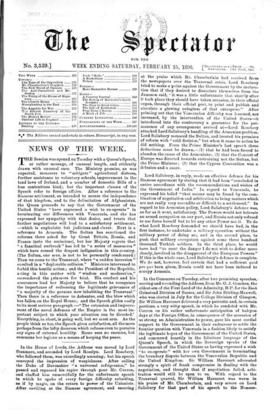Lord Salisbury, in reply, made an effective defence for his
Siamese agreement by stating that it had been "concluded in entire accordance with the recommendations and wishes of the Government of India." In regard to Venezuela, he expressed his belief " that means may be found by the com- bination of negotiation and arbitration to bring matters which are not really very recondite or difficult to a settlement." In regard to his Armenian policy, Lord Salisbury's defence was, as far as it went, satisfactory. The Powers would not tolerate an armed occupation on our part, and Russia not only refused to use force herself but to let any other Power use it. To do what Lord Rosebery demanded we should have bad, in the first instance, to undertake a military operation without the military power of doing so ; and in the second place, to push that military occupation against some three hundred thousand Turkish soldiers. In the third place, he would have had "to meet the danger I do not wish to define more closely, involved in the disapproval of the European Powers." If this is the whole case, Lord Salisbury's defence is complete. We do not, however, feel certain that had a sufficient quid pro quo been given, Russia could not have been induced to occupy Armenia.


































